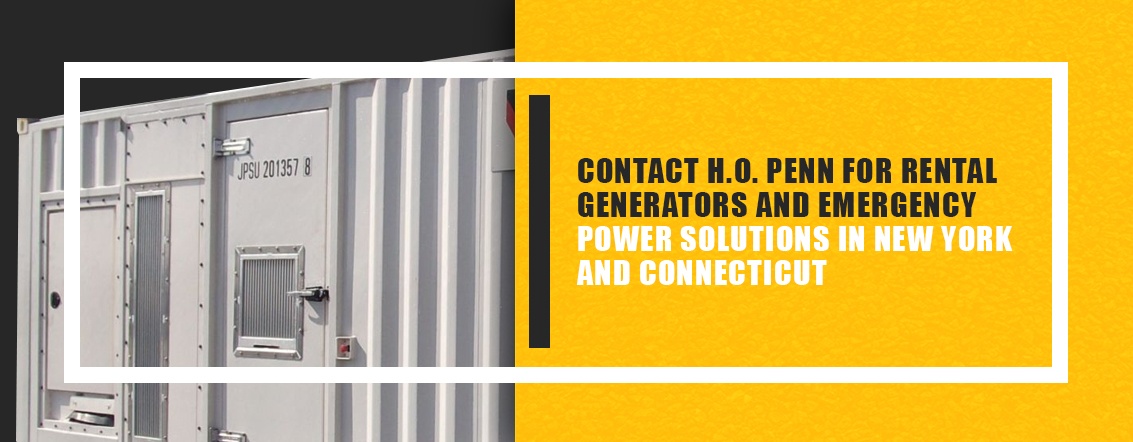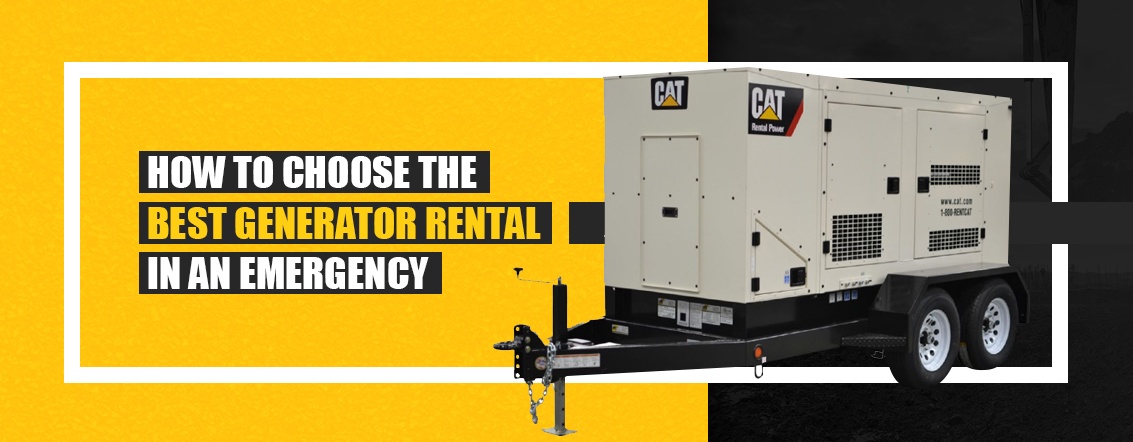
Jump To Sections:
- Why Rent a Generator in an Emergency
- The Importance of Maintaining Power
- Generator Rental Sizes & Types Available
- Exploring the Fuel Options
- How to Choose the Best Generator Size
- Calculating the Necessary Wattage
- Rental Generator Safety Tips
- Cost of Renting a Commercial Generator
- Questions to Ask a Generator Rental Dealer
- Contact H.O. Penn for Rental Generators and Emergency Power Solutions
Power outages are more frequent occurrences than we’d like them to be. Utility power grids can shut down at any time because of storms, fires or internal issues, and when they do, they cause inconvenience and disruption for businesses.
Large-scale power outages around the world have led to millions of dollars in economic losses — such as the $60 million lost in Brazil in 2011 because of a single widespread power outage. Analysis of financial data in the United States suggests that businesses as a whole suffer outage-related losses of about $80 billion a year, but could lose anywhere from $30 billion to more than $130 billion because of loss of power.
Fortunately, a generator rental for emergencies can help keep your business operating at peak efficiency even during a power outage. Below, we’ll lay out the benefits of renting an emergency generator, explain how to choose an emergency generator and offer some rental generator safety tips.
Additional benefits of renting a generator include:
- Affordability: You choose the time frame for the rental contract and pay for only the time you use it with transparent and cost-effective pricing.
- Condition: Rental generators undergo regular maintenance and pre- and post-rental inspections to ensure you’re getting reliable, high-quality equipment.
- Selection: Generator rental pros like H.O. Penn carry an extensive selection of units to meet various demands and applications.
- Equipment sampling: Renting a standby generator lets you decide if a more permanent investment is right for you.
Why Rent a Generator in an Emergency
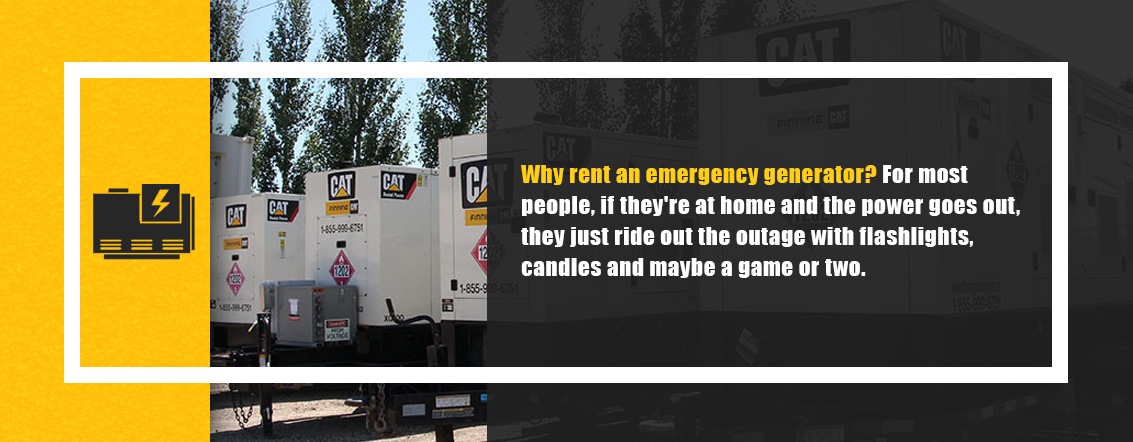
Why rent an emergency generator? For most people, if they’re at home and the power goes out, they just ride out the outage with flashlights, candles and maybe a game or two. But at your place of business, waiting several hours or days for the power to come back on may not be an option.
In an emergency like a power outage, rental generators provide near-immediate relief. Especially if you don’t know how long the power will be out, you can use the rental generator to supply your critical electrical equipment and keep your business moving.
The Importance of Maintaining Power
It’s crucial to maintain power in an emergency for several reasons:
- Meeting deadlines: Deadlines loom whether your business has power or not. Make sure you can meet them by powering your equipment with an emergency rental generator.
- Preventing revenue losses: When your business can’t function because of a power outage, productivity plummets, and revenues quickly start to ebb away. Keep your revenues flowing by allowing your business to continue as usual with a rental generator.
- Preventing food losses: When the power goes out, your company may also experience loss of refrigeration or heating capabilities and lose hundreds or thousands of dollars in spoiled food.
- Powering critical business services: In a power outage, you can’t afford to lose access to important technological equipment. In a hospital environment, your patients may urgently need care, or in an industrial setting, you may need to process a certain amount of material to keep your customers happy.
Power Generator Rental Sizes and Types Available At H.O. Penn
Power generator rental sizes vary considerably. At H.O. Penn, we offer mobile Cat® emergency rental generators in sizes from 20 to 2,000 kilowatts. We offer trailer-mounted and towable options for portability, and we also offer gas, natural gas and diesel models for different fuel types. Below are some of the various power generator rental types we can provide:
- APS150: The APS150 provides 150 kilowatts of power with a voltage of 208 to 480. It is a smaller trailer-mounted generator that weighs 5,942 pounds and can run at a full load for 26.5 hours.
- XQ30: The XQ30 is our smallest generator. It provides 30 kilowatts of power with a voltage of 208 to 480. It is a compact trailer-mounted generator that weighs 3307 pounds and can run at a full load for 29 hours.
- XQ100: The XQ100 provides 100 kilowatts of power with a voltage of 208 to 480. It is a smaller trailer-mounted generator that weighs 5501 pounds and can run at a full load for 30 hours.
- XQ200: The XQ200 provides 200 kilowatts of power with a voltage of 208 to 480. It is a smaller trailer-mounted generator that has a prime rating of 182 electrical kilowatts.
- XQ230: The XQ230 provides 230 kilowatts of power with a voltage of 208 to 480. It is a medium-sized trailer-mounted generator that weighs 16,550 pounds and can run at a full load for 22 hours.
- XQ300: The XQ300 provides 300 kilowatts of power with a voltage of 208 to 480. It is a medium-sized trailer-mounted generator that weighs 16,550 pounds and can run at a full load for 17 hours.
- XQ350: The XQ350 provides 350 kilowatts of power with a voltage of 208 to 480. It is a medium-sized trailer-mounted generator that weighs 19,360 pounds and can run at a full load for 21 hours.
- XQ400: The XQ400 provides 400 kilowatts of power with a voltage of 208 to 480. It is a medium-sized trailer-mounted generator that weighs 21,300 pounds and can run at a full load for 18 hours.
- XQ1000: The XQ1000 provides 1,000 kilowatts of power with a voltage of 208 to 480. It is a larger portable generator that weighs 47,960 pounds and can run at a full load for 17 hours.
- XQ1500: The XQ1500 provides 1,500 kilowatts of power with a voltage of 480. It is a larger portable generator that weighs 59,000 pounds and can run at a full load for 12 hours.
- XQ2000: The XQ2000 is our largest, most powerful generator. It provides 2,000 kilowatts of power with a voltage of 480 to 4160. It weighs 84,000 pounds and can run at a full load for nine hours.
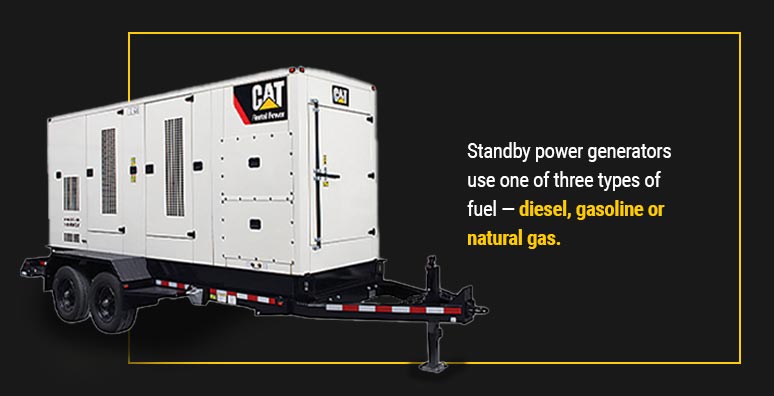
Exploring the Fuel Options
Standby power generators use one of three types of fuel — diesel, gasoline or natural gas. Each has its advantages and disadvantages.
Diesel Power
Diesel fuels are less volatile than gasoline and typically offer more fuel economy. Generators relying on diesel also tend to need less maintenance than their gasoline counterparts.
On the downside, fuel can be in high demand and more challenging to get during a power outage, especially an extended one. Plus, these units are often noisy and may exceed permissible decibel levels in some zoning areas.
Gasoline
Gasoline is generally easy to find. Yet, while it may be widely available, it can also be challenging to get during an outage since fuel pumps require electricity to function — that means you may have to store large amounts of flammable liquid. Additionally, gasoline doesn’t burn as cleanly, and these generator styles may need upkeep more often.
Natural Gas
The primary advantages of natural gas generators are that they burn cleanly and operate reasonably quietly. Plus, they offer odor-free performance. Another important benefit is cost — natural gas is typically more affordable than gasoline or diesel fuel.
On the downside, these generators often require an on-site connection to a fuel source. As a result, they can be a more significant fire hazard and may generate more carbon dioxide during operation.
How to Choose the Best Generator Size
Picking the right size of generator is essential. A generator that’s the right size for the job will last longer and run better, whereas an improperly chosen generator will be prone to shutdowns and failures if the power demands on it exceed its capacity. A properly sized generator is much safer to use, as well.
You need an emergency generator that’s big enough to handle your needs. Alternatively, you don’t want to rent the biggest generator possible if you intend to power only a small space or a modest amount of equipment. Running a generator below 50 percent of its capacity — a practice called wet-stacking — makes it perform less efficiently.
To prevent this problem, generally, you should keep your generator running at 70 to 90 percent of its capacity. Doing this will help your generator provide the power it is capable of, while still allowing for some crucial reserve power.
The following are some essential factors to consider when you’re choosing the size of your generator:
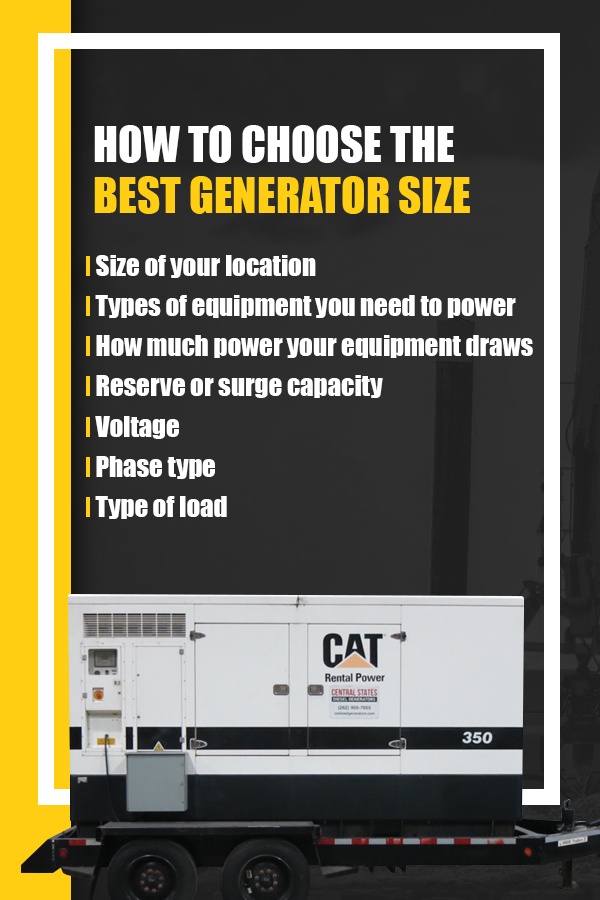
- Size of your location: A larger space likely requires more power and will need a bigger generator. A smaller space can get away with less wattage.
- Site layout: While more expansive sites may need additional power, one larger generator isn’t always the best solution. Placing smaller ones in different locations to power separate areas may be a more efficient option.
- Types of equipment you need to power: If you just need to power a few appliances like refrigerators and furnaces, a generator that produces a few thousand watts is probably sufficient. However, you would need a generator that produces several thousand watts to power a large area like a hospital with several pieces of medical equipment or a construction job site with heavy-duty tools. An industrial location with industrial-strength tools will also require a wattage into kilowatts.
- How much power your equipment draws: To figure out the size of generator you’ll need, total up the wattages of every piece of equipment you plan to run on generator power. When you have this number, you can use it to determine what size of generator is right for you.
- Reserve or surge capacity: You will want to allow for some reserve power, and some types of equipment require more wattage to start than they do to run, so give yourself a comfortable cushion. It’s not enough just to total up all the power you typically use — make sure you allow for more than you think you’ll need in case of power surges or increased demands.
- Voltage: Along with the wattage of the generator you choose, you should also consider its voltage. A generator with a higher voltage will provide a stronger electric current and contribute to the power the generator can provide.
- Phase type: Whether you need a single or three-phase generator will depend on the type of equipment and amount of power you need. A single-phase generator supplies a single current of power that will fluctuate. A three-phase generator provides three different currents that work together to produce constant stable power. For industrial applications, you will likely need a three-phase generator.
- Type of load: Different types of loads make different demands on your generator. If you don’t already know, assess whether your power demands will include motor, lighting, resistive or reactive loads. It’s also essential to determine whether all your electrical equipment will come on at once, which makes a huge demand on your generator, or if different loads will come on at different times. If too many motors come on for the generator to support, the result may be a substantial voltage drop, which can lead to permanent equipment damage.
Calculating the Necessary Wattage
Larger facilities, like hospitals and industrial operations, will need larger motor size and wattage capacity to supply power to their equipment and protect against voltage drops. You can measure the motor capacity required in a few different ways:
- Ammeter: Facility managers can use an ammeter to measure the amount of current in the facility’s electrical panels at peak usage and perform a few computations to arrive at the necessary wattage.
- Tool power requirements: You can base your choice on the wattage from the equipment with the highest need and select one capable of generating that power.
- Utility bills: You can look at recent utility bills to determine the highest historical power usage and choose a generator that would be capable of supplying that wattage.
- Square footage: You can also use the square footage of the facility to estimate how much power you are likely to need, though this method should generally be reserved for nonindustrial spaces such as retail facilities.
Rental Generator Safety Tips
Here are a few safety tips to keep your emergency rental generator running smoothly and safely:
- Inspect the generator thoroughly before use: Make sure there are no loose bolts or threads or frayed cables that could cause malfunction or injury.
- Protect your generator from the elements: Provide as much shelter as possible from moisture and debris that could interfere with peak performance.
- Follow manufacturer recommendations: Set up the emergency generator rental with professional help or by adhering to instructions provided by the manufacturer or rental company.
- Install your generator in a clear space: Never operate your rental generator in an area that contains flammable or combustible materials. Explosions, fires, injury and even death could result.
- Install your generator in an open space: Make sure the space where your generator will operate receives plenty of airflow and ventilation. Restricted airflow and poorly ventilated exhaust could damage to the generator and cause carbon monoxide poisoning.
- Provide proper grounding: Provide earth grounding according to National Electric Code (NEC) regulations to reduce the risk of electric shock.
- Do not overload the generator: Once you’ve settled on a particular generator size, do not overload it with more equipment than it was intended to support. Doing so makes the generator run poorly, can ruin equipment and could lead to injury as well.
- Wear personal protective equipment: Always wear protective equipment — including shatterproof glasses or goggles and steel-toed boots — when operating your rental generator.
- Stay alert: Never operate your rental generator if you have taken medication that induces drowsiness or if you are feeling less alert than usual.
- Use the recommended parts: Never use cords or other accessories that the manufacturer or rental company has not specifically approved.
- Be mindful of high temperatures: Allow the generator to cool before performing maintenance or moving the generator. You should also allow it to cool thoroughly before refueling. Avoid touching hot components like the exhaust manifold — doing so could lead to serious burns.
- Keep hands clear: Do not insert hands or fingers into the generator engine when it is running.
- Do not try to service a running generator: Make sure the generator is disconnected from any power source before you perform maintenance. You should also refrain from switching voltage selectors and other settings during operation
- Monitor for backfeeding: Sometimes, a generator may produce excess power and feed it back into your electrical grid. This backfeeding is dangerous and is illegal in most states.
- Seek professional guidance: Especially if you are installing an industrial-sized rental generator, get the advice and assistance of a professional engineer, especially with the electrical installation. Doing so will help ensure you have the right size of generator and can meet your power needs without damaging the generator or your own equipment or causing severe injury to anyone in your building.
Cost of Renting a Commercial Generator
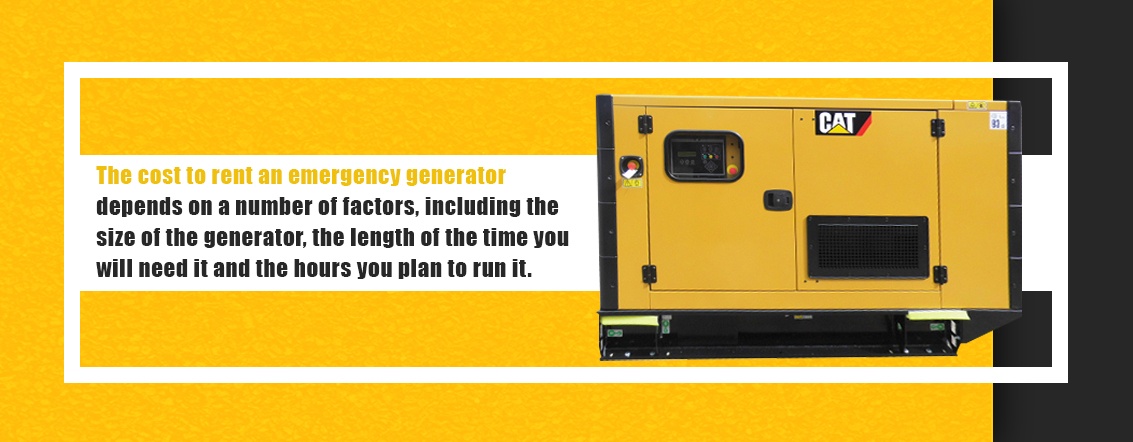
How much does an emergency generator rental cost? The cost to rent an emergency generator depends on a number of factors, including the size of the generator, the length of the time you will need it and the hours you plan to run it. Because of the number of variables that go into generator rental pricing, it’s difficult to give definite quotes without knowing your specific circumstances.
If you’re looking for an emergency rental generator, the best thing to do is to call a local rental company and explain the details of your situation. A quality rental company will have a customer service department that can answer your questions and can give you an idea of applicable prices.
Choosing the right size of generator will also help you save money. A generator that’s overpowered for your situation won’t work efficiently and will cost you much more to rent. Make sure you’ve figured out the size of generator you need, or consult with your rental company to avoid overpaying for potential power you won’t use.
Questions to Ask a Generator Rental Dealer
When you’re talking to an emergency generator rental dealer, ask questions to make sure you’re getting the generator that works best for your application. Below are a few questions to consider asking before you commit to a rental agreement:
- What ranges of kilowatt production can your generators supply?
- What are your rental rates per day?
- What are your rental rates per hour of use?
- How quickly can you get a generator to me in an emergency?
- What types of fuel do you supply?
- Will you supply the generator accessories?
- Will your team help install the generator?
- What other technical assistance can you provide?
- What do I need to do to maintain a rental generator properly?
- Do you often supply generators to industries or facilities like mine?
- These are my applications and loads. What kind of generator would be best for them?
- These are my voltage requirements. What kind of generator can provide these?
- Here is the layout of my facility. What kind of generator can supply power to this space?
Contact H.O. Penn for Rental Generators and Emergency Power Solutions in New York and Connecticut
To prevent costly losses and help keep your business running safely and smoothly during a surprise power outage, contact H.O. Penn for a quick, reliable and cost-effective emergency generator rental. We can provide you with the size of generator that will best fit your applications.
Start reaping the benefits of rental generators in an emergency. Stop by one of our locations in Holtsville, Bronx, Newington, Poughkeepsie, Bloomingburg and Medford, give us a call for more information at 845-452-1200, or contact us online today.

